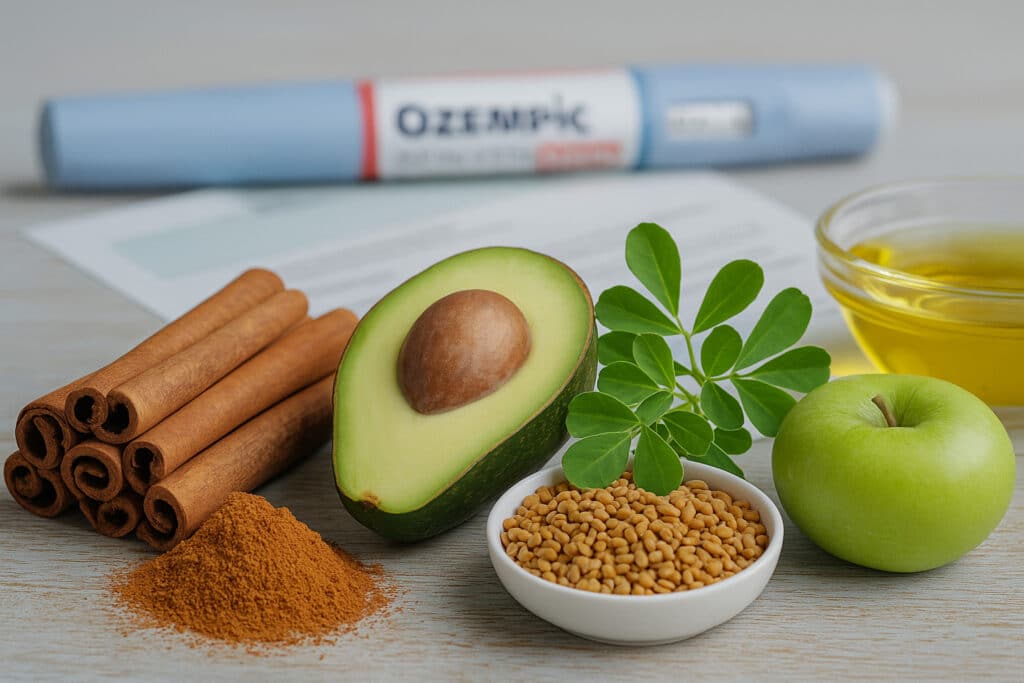Ozempic (active ingredient: semaglutide) is a medication originally developed for treating type 2 diabetes. It belongs to the group of GLP-1 receptor agonists, substances that stimulate insulin production, stabilize blood sugar levels, and reduce hunger. These effects have made Ozempic popular among people who want to lose weight or regulate their blood sugar.
However, Ozempic also has drawbacks. It can cause side effects such as nausea, diarrhea, abdominal pain, and fatigue. Moreover, the medication is expensive and not always (fully) covered by health insurance. Due to current shortages, many people are looking for natural alternatives to Ozempic, substances that help with weight management and healthy blood sugar regulation, without medication. Below we discuss three proven natural strategies.
1. Healthy nutrition as a natural alternative to Ozempic
A balanced diet is one of the most powerful ways to stabilize blood sugar and reduce hunger. Research shows that a diet rich in fiber, protein, and healthy fats can improve insulin sensitivity and prevent overeating.
Nutrition Tips for Natural Blood Sugar Regulation
- Fiber-rich foods: Whole grains, vegetables, fruits, and legumes slow down glucose absorption. According to research by Slavin (2013), this helps people with type 2 diabetes and with weight loss.
- Proteins: Lean proteins (such as chicken, eggs, fish, nuts, and seeds) provide long-lasting satiety, similar to Ozempic’s appetite-suppressing effect.
- Healthy fats: Unsaturated fats from avocado, olive oil, and fatty fish help maintain stable blood sugar and reduce inflammation.
Want to further support your healthy diet? Check out the organic superfoods for more energy from DutchMicrodosing. These natural products are packed with antioxidants, fiber, and other substances that may contribute to stable blood sugar levels and increased vitality.

2. Natural supplements and herbs with Ozempic-like effects
Certain herbs and supplements can partially mimic Ozempic’s effects by lowering blood sugar levels or reducing appetite. Below you’ll find some scientifically researched options:
- Cinnamon: Can improve glucose tolerance and reduce insulin resistance. A natural way to maintain stable blood sugar levels.
- Berberine: A plant-based supplement derived from Berberis vulgaris among others. According to research by Yin et al. (2018), berberine has similar effects to metformin, a well-known diabetes medication.
- Gymnema sylvestre: Traditional Ayurvedic herb that inhibits sugar absorption and suppresses appetite. Can help with weight management.
- Fenugreek: Slows carbohydrate absorption and improves insulin function. Research by Kassaian et al. (2009) shows that fenugreek powder can lower fasting blood sugar in people with type 2 diabetes.

3. Intermittent fasting and calorie restriction
Intermittent fasting (also known as intermittent fasting) is a natural method that’s becoming increasingly popular. By alternating between eating and fasting, the body can use fat reserves more efficiently, leading to weight loss and improved insulin sensitivity.
According to research by Patterson and Sears (2017), intermittent fasting can contribute to better glycemic control and accelerated fat burning. Popular schedules include:
- 16:8 schedule: 16 hours fasting and 8 hours eating per day.
- 5:2 schedule: 5 days of normal eating and 2 days of mild calorie restriction.
Importance of medical supervision
While natural alternatives to Ozempic are promising, they remain less potent than pharmaceutical drugs. People with type 2 diabetes or obesity should never stop their medication without consulting a doctor. Natural methods can work supportively within a medical treatment plan.
Always seek guidance from a doctor or dietitian before starting supplements, herbs, or a new diet.
Disclaimer: This article is for informational purposes only and does not replace professional medical advice. Always consult a doctor before changing medication or using natural supplements.







